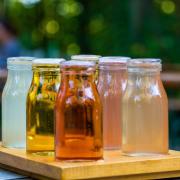As is the case with many American cities, the unique character of Grand Rapids was shaped largely by successive waves of European settlers. Germans, Poles, Italians, English, Irish and French immigrants all made substantial contributions to the city. But no European group is more associated with Grand Rapids than the Dutch.
Large numbers of people from the Netherlands began arriving in West Michigan as early as 1846, when a group fleeing religious persecution established a colony in Holland, just west of Grand Rapids. The group formed a congregation of the Reformed Church of America, a Protestant denomination founded on Calvinist values. In 1857, some members of this group seceded to form the Christian Reformed Church.
More than 150 years later, Grand Rapids serves as home base for the Christian Reformed Church of North America, and hosts one of four nationwide denominational offices for the Reformed Church in America. Many local churches, colleges, charities and businesses are sponsored by or affiliated with one or the other.
Thousands of Dutch immigrants came to West Michigan in the decade or so after the first Holland settlement. Many of them were farmers who found a rich outlet for their skills in the area's unique climate and fertile soils. Today, many of the area's numerous family farms still bear Dutch surnames, from Lubbers and Sietsema to Veldheer and Versluis.
Between the 1860s and World War I, more immigrants came for economic rather than religious reasons, lured by abundant farmland and well-paying factory work in Holland and Grand Rapids. Later, area families and churches sponsored refugees from the devastation of World War II.
Throughout this period, Grand Rapids became known as a center for Dutch religious and cultural life in America. The Dutch influence has diminished in the last few decades as the city has grown. Still, more than one-third of area residents claimed some Dutch ancestry in the 2000 census.
Annual Events
- The Tulip Time Festival (May), named America’s Best Small Town Festival, presents authentic Dutch markets, traditions and attractions, including millions of tulips in bloom. It’s held in Holland, just 30 minutes west of Grand Rapids.
Points of Interest
- Many of the area's leading businesspeople and philanthropists boast Dutch ancestry – and their Dutch names adorn many local landmarks, including DeVos Place Convention Center , Frederik Meijer Gardens & Sculpture Park , Van Andel Arena and more.
- Peters Gourmet Market and Vander Veen's Dutch Store stock imported Dutch foods and specialty items.
- Locals shop Steenstra’s Royal Dutch Bakery and Van's Pastry Shoppe for authentic Dutch breads, sweets and more.
- Bier Distillery crafts a number of Dutch-themed liqueurs, including Stroopwafel cookie liqueur, Banket almond liqueur and Hopjes coffee candy liqueur. Bier’s food menu also incorporates Dutch influences.
- Calvin University is a highly ranked liberal arts college founded here in 1876 by the Christian Reformed Church in North America, which was formed by Dutch immigrants in 1857.
- Holland, Michigan – 30 minutes west of Grand Rapids – is awash with Dutch heritage sites including DeKlomp Wooden Shoe & Delft Factory, Nelis’ Dutch Village, Veldheer Tulip Farm and Windmill Island Gardens.



